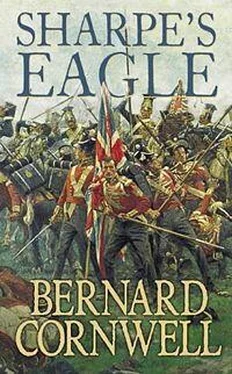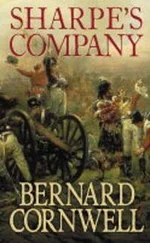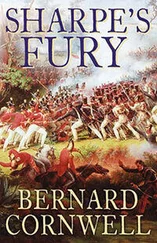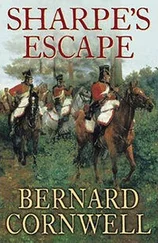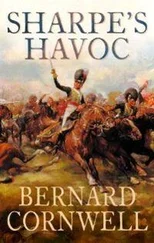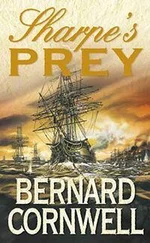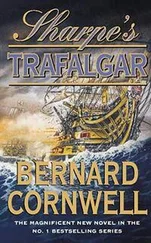Sharpe looked round. The loaded rifle was five yards away and he ran towards it, knowing it was too far, hearing the hooves behind him, and then the sabre cut into his pack and threw him flat on the ground. He fell on the Eagle, twisted to his right, and the horse was pirouetting above him, the hooves like hammers above his face, and the sabre blade was a curve of light behind the glinting horseshoes. He rolled again, felt a numbing blow as one of the hooves struck his shoulder, but he kept rolling away from Gibbons’ sabre. It was hopeless. The grass smelt in his nostrils, the air was full of the flying hooves, the horse staying above him, treading beside him; he waited for the blade to spike into him and pin him to the dry ground. He was angry with himself, for being caught, for forgetting about Gibbons, and he wondered how long the Lieutenant had stalked him through the smoke.
He could hardly move his right arm, the whole of it seemed paralysed by the blow from the hoof, but he lunged up with the Eagle as if it was a quarterstaff, trying to force the hooves away from his body. Damn that magpie! Couldn’t Harper hear the fight? Then the sabre was over his stomach and Gibbons’ smiling face was above him, and the Lieutenant paused. “She felt good, Sharpe. And I’ll take that Eagle as well.”
Gibbons seemed to laugh at him, the Lieutenant’s mouth stretching and stretching, and still he did not stab downwards. His eyes widened and Sharpe began to move, away from the sabre, climbing to his feet, and he saw the blood coming from Gibbons’ throat and falling, slowly and thickly, on the sabre. Sharpe was still moving, the Eagle swinging, and the wing of the French trophy smashed into Gibbons’ mouth, breaking the teeth, forcing back the head, but the Lieutenant was dead. The Eagle had forced him back, but the body toppled towards Sharpe and in its back, through the ribs, was a bayonet on a French musket. Sergeant Harper stood on the far side of the horse and grinned at Sharpe.
Gibbons’ body slumped beside the horse and Sharpe stared at it, at the bayonet and strange French musket that had been driven clean into the lungs and was stuck there, swaying above the body. He looked at Harper.
“Thank you.”
“My pleasure.” The Sergeant was grinning broadly, as if he had been pleased to see Sharpe scrambling for his life. “It was worth being in this army just to do that.”
Sharpe leaned on the Eagle’s staff, catching his breath, appalled at the closeness of death. He shook his head at Harper. “The bastard nearly got me!” He sounded astonished, as if it had been unthinkable for Gibbons to prove the better fighter.
“He would have had to finish me off first, sir.” It was said lightly enough, but Sharpe knew the Sergeant had spoken the truth, and he smiled in acknowledgement and then went to pick up his rifle. He turned again. “Patrick?”
“Sir?”
“Thank you.”
Harper brushed it off. “Just make sure they give us more than a hundred guineas. It’s not every day we capture a bloody Eagle.”
Gibbons was not carrying much: a handful of guineas, a watch broken by his fall, and the expensive sabre that they would be forced to leave behind. Sharpe joined Harper and, kneeling by the crumpled body, he thrust his hand into Gibbons’ collar and found what he had half expected: a gold chain. Most soldiers carried something valuable round their necks and Sharpe knew that, should he die, some enemy would find the bag of coins round his own neck. Harper glanced up. “I missed that.”
It was a locket and inside, a girl’s picture. She was blonde, like Gibbons, but her lips were full where his were thin. Her eyes, despite the smallness of the miniature, seemed to look out of the gold case with amusement and life. Harper leaned over. “What does it say, sir?”
Sharpe read the words inscribed inside the open lid.
“God keep you. Love, Jane.”
Harper whistled very softly. “She’s a pretty one, sir. Must be his sister.”
Sharpe took the locket and pushed it into his cartridge pouch and then glanced once more at the dead man with the blood glistening on his thin face. Did she know what kind of man her brother was?
“Come on, Sergeant.”
They walked over the grass, stamping through the flames, until they saw the solitary yellow colour of the South Essex. Lieutenant Knowles saw them first, shouted, and suddenly the Light Company were round them, slapping their backs, speaking words they could not hear and pushing them towards the group of horsemen by the colour. Sharpe looked past a beaming Forrest to see Lawford. “Sir?”
Lawford laughed at Sharpe’s surprise. “I understand you have the honour to command my Light Company?”
“Yours?”
Lawford raised his eyebrows. He was exquisite with silver lace. “Do you disapprove, Captain Sharpe?”
Sharpe grinned and shook his head. “Sir Henry?”
Lawford shrugged his elegant shoulders. “Shall we just say that Sir Henry suddenly felt a burning desire to return to the good Burghers of Paglesham.”
Sharpe wanted to laugh. He had kept the promise to Lennox, but he knew the real reason he had hacked his way to the French Eagle was to save his own career, and had it all been unnecessary? Denny’s death, the killing of so many others, just so he would not go to the West Indies? The trophy was low at his side, hidden in the press of men, but he dragged it clear so that the gilded statuette suddenly flashed in the light. He handed it up to Lawford. “The Battalion’s missing colour, sir. It was the best Sergeant Harper and I could do.”
Lawford stared at the two men, at the tiredness beneath the powder stains, at the lines on their faces grooved with blood from scalp wounds, and at the black patches where bayonets had sprung blood into their green jackets. He took the Eagle, disbelieving, knowing it was the one thing that would restore the Battalion’s pride, and hoisted it high into the air. The South Essex, so long scorned by the army, saw it and cheered, slapped each other’s backs, hoisted their muskets triumphantly into the air, and cheered until other Battalions stopped to see what the noise was about.
Above them, on the Medellin, General Hill heard the excitement and trained a telescope onto the Battalion that had so nearly lost the battle. He caught the Eagle in the lens and his mouth dropped open. „I’ll be damned! Bless my soul! The strangest thing. The South Essex have captured an Eagle!“
There was a dry laugh beside him, and Hill turned to see Sir Arthur Wellesley. “Sir?”
“I’ll be damned too, Hill. That’s only the third time I’ve ever heard you swear.” He took the glass from Hill and looked down the slope. “God damn it! You’re right! Let’s go and see this strange bird.”
The wine was dark red in the crystal glasses, the deep polished table shone from a score of candles in their silver holders, the paintings whose ancient varnish reflected the circle of light showed grave and eminent ancestors of the Spanish family in whose Talavera mansion Sir Arthur Wellesley was host to a dinner party. Even the food was fairly equal to the occasion. In the week since the battle the supply situation had worsened, the Spanish promises unfulfilled, and the troops were on meagre half-rations. Wellesley, as befitted a General, had done better than most, and Sharpe had sipped a slightly watered down chicken soup, enjoyed jugged hare, eaten amply of Wellesley’s favourite mutton, and listened to his fellow guests grumble about the diet as they drank unending bottles of wine. “Daddy‘ Hill was there, rubicund and happy, continually smiling at Sharpe, shaking his head and saying, ”Bless me, Sharpe, an Eagle.“ Robert Crauford sat opposite Sharpe; Black Bob, whom Sharpe had not seen since the retreat to Corunna. Crauford had missed the Battle of Talavera by one day even though he had marched his crack Light Division forty-two miles in twenty-six hours to catch up with Wellesley. Among the troops he had brought from England were the First Battalion of the 95th Rifles, and Sharpe had already been generously entertained by their mess in celebration of his feat. They had done more than that. They had presented him with a new uniform and he sat at Wellesley’s table resplendent in smart green cloth, black leather, and silver trappings. He had kept his old uniform. Tomorrow, when the army marched again, he would prefer to wear the bloodstained cavalry overalls and the comfortable French boots rather than this immaculate uniform and fragile shoes.
Читать дальше
